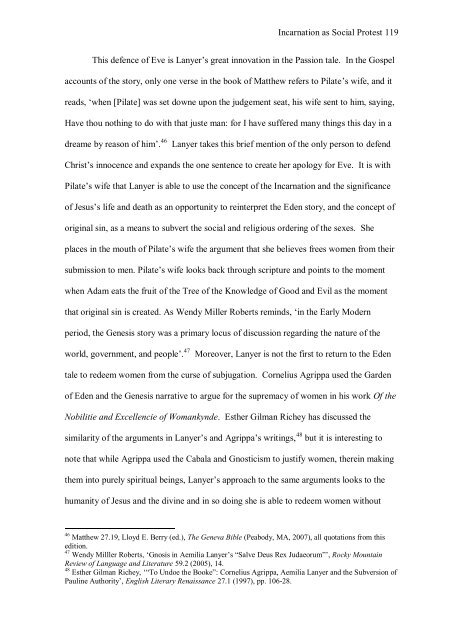Jesse Sharpe PhD thesis - Research@StAndrews:FullText ...
Jesse Sharpe PhD thesis - Research@StAndrews:FullText ...
Jesse Sharpe PhD thesis - Research@StAndrews:FullText ...
You also want an ePaper? Increase the reach of your titles
YUMPU automatically turns print PDFs into web optimized ePapers that Google loves.
Incarnation as Social Protest 119<br />
This defence of Eve is Lanyer’s great innovation in the Passion tale. In the Gospel<br />
accounts of the story, only one verse in the book of Matthew refers to Pilate’s wife, and it<br />
reads, ‘when [Pilate] was set downe upon the judgement seat, his wife sent to him, saying,<br />
Have thou nothing to do with that juste man: for I have suffered many things this day in a<br />
dreame by reason of him’. 46<br />
Lanyer takes this brief mention of the only person to defend<br />
Christ’s innocence and expands the one sentence to create her apology for Eve. It is with<br />
Pilate’s wife that Lanyer is able to use the concept of the Incarnation and the significance<br />
of Jesus’s life and death as an opportunity to reinterpret the Eden story, and the concept of<br />
original sin, as a means to subvert the social and religious ordering of the sexes. She<br />
places in the mouth of Pilate’s wife the argument that she believes frees women from their<br />
submission to men. Pilate’s wife looks back through scripture and points to the moment<br />
when Adam eats the fruit of the Tree of the Knowledge of Good and Evil as the moment<br />
that original sin is created. As Wendy Miller Roberts reminds, ‘in the Early Modern<br />
period, the Genesis story was a primary locus of discussion regarding the nature of the<br />
world, government, and people’. 47<br />
Moreover, Lanyer is not the first to return to the Eden<br />
tale to redeem women from the curse of subjugation. Cornelius Agrippa used the Garden<br />
of Eden and the Genesis narrative to argue for the supremacy of women in his work Of the<br />
Nobilitie and Excellencie of Womankynde. Esther Gilman Richey has discussed the<br />
similarity of the arguments in Lanyer’s and Agrippa’s writings, 48 but it is interesting to<br />
note that while Agrippa used the Cabala and Gnosticism to justify women, therein making<br />
them into purely spiritual beings, Lanyer’s approach to the same arguments looks to the<br />
humanity of Jesus and the divine and in so doing she is able to redeem women without<br />
46 Matthew 27.19, Lloyd E. Berry (ed.), The Geneva Bible (Peabody, MA, 2007), all quotations from this<br />
edition.<br />
47 Wendy Milller Roberts, ‘Gnosis in Aemilia Lanyer’s “Salve Deus Rex Judaeorum”’, Rocky Mountain<br />
Review of Language and Literature 59.2 (2005), 14.<br />
48 Esther Gilman Richey, ‘“To Undoe the Booke”: Cornelius Agrippa, Aemilia Lanyer and the Subversion of<br />
Pauline Authority’, English Literary Renaissance 27.1 (1997), pp. 106-28.
















